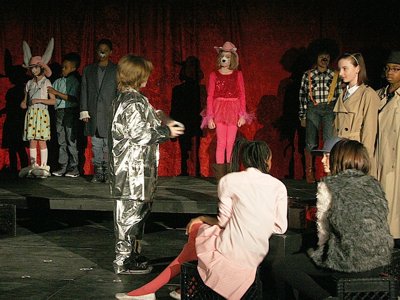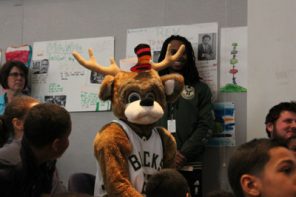Kids running around, yelling and playing and chasing each other. Fold out chairs neatly organized into rows filling a small grade school gymnasium, surrounding an unadorned stage of black platforms and black curtains. Parents and adult helpers setting up cameras and helping to set the lights and technical side of the show. Nothing seemed too out of the ordinary while awaiting the start of a dress rehearsal for Highland Community School’s production of “Judy Plays With Fire,” hitting the stage Wednesday, March 11 and again Friday, March 13 at 6:30 p.m.
And then the show began.
Strobe lights flashed. Smoke billowed. Characters unsettlingly laughed and staggeringly talked like they were imitating what seemed like human interaction. Kids behaving like animatronic animals danced while people in suits insisted that everything was normal. A mysterious character in a shiny suit named The Slinky Boy kept popping on and off the stage, ominously foretelling all.
As soon as the lights went down, the happy typical childish shenanigans from before morphed into a hallucinatory Lynchian nightmare – which meant everything was going great. After all, that’s exactly what “Judy Plays With Fire” is: a hallucinatory Lynchian nightmare … that just happens to be written for and starring grade school students.
For the show’s writer and director Barry Weber, however, the goal isn’t to shock or snag headlines with some “Hamlet 2”-esque performance art stunt. The mission is quite simple: fun.
“When I was a kid, I always loved to do plays, but I was always the tree or the rock,” Weber said. “I still remember those days, so I try to write parts that all have some fun element to them. I try to write plays that get the kids out there and have fun being weird and exploring different territories. I try to write the plays I always wanted to be in when I was a kid. Of course, I didn’t know who David Lynch was when I was eight …”.
The idea of kids starring in an homage to David Lynch – an auteur best known for “Twin Peaks,” two of the more unsettling movies ever created (“Eraserhead” and “Blue Velvet”) and “Mulholland Dr.,” a film in which the key turning point is a lesbian scene – may sound like the premise for a bizarre “SNL” sketch, but for Weber and Highland Community School, after seven years working together, a dash of weird is now the expected.
Weber and Highland Community School students previously put on a show called “Penguin Attack,” a zombie movie with – you guessed it – penguins in the place of the undead (“that had a nice moral lesson to it to,” Weber added). Last year, the show was an “Escape From New York”-influenced cyberpunk play about the history of numbers and the idea that the concept of zero was very controversial in the Western world.
“The idea was how can we top that,” Weber said, “and there was just this feeling of, ‘Let’s try a David Lynch play.’”
The resulting script tells the story – as far as one can understand a David Lynch-inspired plot – of a detective hunting down a missing person in Centerville, “the most normal town in America” according to the insistent townsfolk. Over the course of the investigation, the detective falls down a rabbit hole of Lynchian terrors: mysterious lodges with eerie hosts, reality-blurring dreams, extradimensional figures and shady business dealings.
Fans of Lynch will find plenty of Easter eggs scattered throughout the show, from a Black Lodge-like locale to a character named Mr. Frost to themes of identity and the hidden rot inside seemingly innocent, small-town America. Perhaps the most impressive homage, however, is the overall aesthetic and vibe of “Judy Plays With Fire,” capturing Lynch’s signature dreamlike feel of inescapable, entrancing, otherworldly unease – all words that have likely never been used to describe a grade school production.
“David Lynch isn’t usually for kids, but a lot of his aesthetics can certainly be,” Weber said. “It’s just that his content isn’t child-friendly. So how can we do something – because kids at this age still have great use of their imaginations, and they love the ideas of surrealism and whatnot – to put that into a child-friendly format for them that’s still kind of edgy and cool and let’s them not just be in a silly play that doesn’t do much for intelligence or respect their intelligence?”
Neither of the two child actors I interviewed had seen any David Lynch material, much less knew who he was, but they and the rest of the crew were still excited about the show. Weber noted that the cast has been eagerly holding onto the script’s big twist since the first day, teasing it to their classmates like a good movie trailer and even using some misdirection that would make J.J. Abrams proud.
“The kids definitely grasp that they’re doing something out there, and that idea is something they’re really excited about,” Weber said. “Some of kids have come from other schools where they know the typical school play is cutesy and just something for them to sing while their parents take pictures.”
It’s no surprise the kids have taken well to the show’s weirdness; kids are often much more intrigued by scary things than they let on. But what about the parents? There’s nothing inappropriate – no language or sexuality of any kind – in the play, but it’s still very odd, weird and even a touch unsettling.
“Our community is really, really supportive,” Weber said. “They know these are very unconventional plays, and they appreciate it. Though one parent just recently said to me, ‘I haven’t read the script yet that my child has; I’m waiting to be surprised!’ I’m like, ‘OK …’.”
“Plus, all the parents who are fans of ‘Twin Peaks’ are all just so excited for this,” he added.
They’re not the only ones either. According to Weber, David Lynch himself has been made aware of “Judy Plays With Fire,” and he’s “extremely excited” to hear that they’re bringing his bizarre style and his essence to the stage.
“I imagine he’ll see it as a nice homage,” Weber said. “I’m sure he’ll think this is interesting: ‘Here are some nine-year-olds doing something that I never planned for nine-year-olds necessarily.’”


 i evaluate to yes even if there's no image
i evaluate to yes even if there's no image  i evaluate to yes even if there's no image
i evaluate to yes even if there's no image  i evaluate to yes even if there's no image
i evaluate to yes even if there's no image  i evaluate to yes even if there's no image
i evaluate to yes even if there's no image  i evaluate to yes even if there's no image
i evaluate to yes even if there's no image  i evaluate to yes even if there's no image
i evaluate to yes even if there's no image 